Original Air Date: August 9, 2006
Director: David Straiton
Warning: the following review contains spoilers for this and the previous episodes of Blade: The Series. You can watch this episode free at thewb.com.
Before I review this episode I wanted to share a revelation I had while driving to work this morning: this is a series truly made for comic book fans, not just because it stars a comic book character but because it is written and paced like a comic book series. Series runners Geoff Johns and David S. Goyer both have previously written for comic books so this type of storytelling must come very naturally to them. But taking every episode of Blade as a single issue, I see all the elements that were common in every issue of a serialized comic book: a fight or two, a few teases about a larger story or conspiracy, and a villain from a couple issues back returns to continue their role in the saga. So the pacing and storytelling that frustrates me as a regular viewer of serialized television comes directly from Blade’s comic book origins, and I wonder if it clicked with the comic set.
I’m not sure this type of comic book pacing holds true for comics written today, with the intent of arcs being compiled and sold as trade paperbacks. Not every issue stands alone in today’s comics, nor do they always contain a big fight. However, in the 70’s and 80’s these conventions were expected.
Truly the two mediums should be somewhat similar in storytelling, but I think comic book audiences may be conditioned to be more forgiving than television viewers, and often pacing that works in the printed medium doesn’t work in a visual one.
But as I put to bed the pacing problems I had with previous episodes of Blade I actually now have the pleasure of reviewing my single favorite episode of the series so far — Sacrifice, a great tale about family, and in it we have two parallel stories.
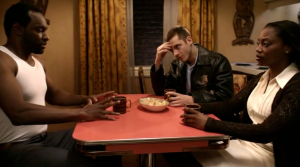
Blade's father, stepmother, and Flanigan try to keep Blade's hunger satiated lest they be his next meal.
Our primary story is Blade’s (Kirk “Sticky Fingaz” Jones), as it should be but often hasn’t been. Steppin’ Razor (Bokeem Woodbine), the vampire from Blade’s past introduced to in Episode 4, is back and there is still some “Bad Blood” between the two. Now, rather than attack Blade directly, Steppin’ Razor is murdering seemingly random people, including a cop and an elderly nurse. Flashbacks tell us these victims all have some kind of connection to Eric Brooks (Blade’s childhood identity).
It seems the past several episodes have really wanted to include Blade’s origin story with its chronicle of the House of Chthon. Episode 4 had the Bad Bloods talking about Blade’s induction in the gang while Episode 6 showed Blade having visions of his mother while pregnant with him. But the problem with both those episodes was the ham-handed way they tried to tell us about Blade’s past in a way that truly had little impact on the rest of the story. It was information Blade fans may drink up, but any casual TV viewer would be turned off by the lack of story and excitement.
But in this episode, they successfully link Blade’s present with his past, and rather than having people talk about Blade’s childhood as they did in Episode 4, here they show us through flashbacks. Admittedly this was a common storytelling device in the first three seasons of Lost, but Blade utilizes the storytelling technique very well here.
We see Blade as a child (Jon Kent Ethridge) on the verge of adolescence, cared for by his father Robert Brooks (Colin Lawrence). Robert knew of Eric’s vampiric nature, so when not supervised he would chain the boy up in a locked room and give him blood transfusions to stave off Eric’s hunger.
Robert’s aided in the cover-up of his son’s monstrous side by Viola (Robinne Fanfair), a nurse at a local hospital. Viola steals bags of human blood from the hospital to transfuse into Eric after it is discovered cow blood made Blade ill. Also helping is Officer Flannigan (Elias Toufexis), a local cop who helped keep Eric under control.
But as Eric reaches adolescence his hunger cannot be maintained. He tears open a bag of blood with his teeth and drinks it, and vamps out when angry. Desperate, Eric calls in help in the form of a vampire hunter Abraham Whistler (Adrian Mcmorran).
However, Whistler’s primary motivation isn’t to help Eric but to either kill him or turn him into a weapon that can aid Whistler’s war against vampires. Hearing this through a door, Eric smashes his hand with a cinder block to escape his chains and runs away to his friend Mr. Taka’s convenience store. However, the store is being robbed. Eric defends Mr. Taka by killing and feeding on both robbers–Blade’s first kills.
His feeding is interrupted by Robert and Whistler, and one of the robbers fires off a shot, hitting Robert in the stomach. Thinking his father dead, Eric runs away to not be seen again.
While being a flashback in this episode, this is a truly great, emotional story. Here we get answers to questions that have to be asked, such as how does anyone raise a half-vampire without ending up in the news? How did the thirst stay under control before Whistler came up with the serum? But not only are those questions answered but we also have some wonderful emotions as we watch a parent covering up the crimes of a child, and a child trying to come of age and come to terms with what he is.
In addition, we get Whistler, and he has a grand entrance. Sure, this is not played by Kris Kristofferson, it’s a much younger man, but he is given an incredible entrance and the fanboy in me buzzed with delight at seeing Whistler again. While this does create some continuity problems with the first Blade film, where Whistler said he found Blade as a teenager on the street eating homeless people, it is worth it to explain why Whistler would know what Blade was and where to look for him.
And we also see Blade is the one who broke Whistler’s leg, attacking Whistler while escaping from Mr. Taka’s store. Again, this is a very Star Wars-y “certain point of view” interpretation of when Whistler says his leg was injured by vampires, it adds a bit of redemption to Blade’s side of his partnership with Whistler.
If all of that wasn’t enough, the production values of these flashbacks are first rate. The production team went through the trouble to get period-accurate costumes, hairstyles, and even background score music for these scenes. And it feels real, never coming across as a parody like That 70’s Show. So kudos all around for a wonderful flashback setting and story.
But even better, that story feeds into the present day. What I don’t think I realized until this episode was that Blade was originally from Detroit; his coming to Detroit wasn’t just to hunt the House of Chthon, it was a homecoming after the events in Blade: Trinity. Perhaps I should have gotten this more clearly when the Bad Bloods came in, but it was never driven home until now.
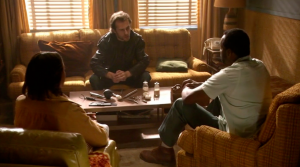
In case you thought Whistler hardened with age, even in the 70's he was ready to train Blade...or kill him.
But with Steppin’ Razor having survived his last fight with Blade, he is now making it personal, finding Eric Brooks’ friends and helpers and killing them one by one. Flannigan and Mr. Taka are killed, but Blade and Shen arrive just in time to revive Viola, who Steppin’ Razor tried to drown at the nursing home where she worked. Viola then points Blade to Razor’s next victim–Blade’s father. With medical aid by Viola, Robert Brooks survived the shooting, and with Blade having returned to Detroit so did Robert, wanting to reconnect with his son.
Blade rushes to the abandonned apartment building where he grew up, and has a rematch with Steppin’ Razor.
And, once again, the series gets it right. Steppin’ Razor wants to kill Blade and his father. This is a fight with stakes (in both senses of the word!), and that’s something this show has been lacking in so many episodes where Blade slaughtered faceless vampires.
And the fight is well constructed, with Blade and Steppin’ Razor evenly matched, and when Steppin’ Razor dies with Blade’s sword to his chest it’s a triple surprise — first because Blade was not fighting with his sword, second because it’s Robert Brooks taking Blade’s sword and interrupting the fight, and third because to get at Steppin’ Razor he stabbed Blade clean through!
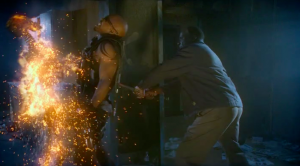
Someone should tell Robert Brooks that the best tactic to reconnect with your estranged son is not to literally stab him in the back, even if it is to save his life.
And if all that wasn’t enough, Blade’s father is played by Richard Roundtree! The 70’s love continues as the original, and best, Shaft shows up as Blade’s older father. This casting is so perfect in that Roundtree’s Shaft was the original bad ass, and now he is the father to a bad ass vampire killer. It keeps with the 70’s vibe of the episode, and just makes perfect sense. The only regret I had was that it was spoiled in the opening credits so I knew that bad mutha (shut yo mouth!) would show up in the episode; had they resisted the urge to put him in the credits it would have been even better still.
All of this makes for honestly a better Blade story than we got in three movies. And in it, Sticky Fingaz does very well. When reunited with his father, Sticky rides the perfect line, showing a character trying to keep emotions under control while completely denying his father, saying “My father was the vampire that bit my mother, you’re just the guy who got stuck holding the bag.” It was dramatic, but it was also believable that Blade would want to hurt his father with words, even though we know Blade isn’t being totally honest after spending so much time trying to save his father.
Emotional resonance like this is something this series has not been able to accomplish in its first six episodes, and I’m so happy to have some now. If the back six are all like this, the journey will have been well worth it.
In the episode’s B storyline, Krista Starr (Jill Wagner) is dealing with her mother’s death from Leukemia. While I wasn’t a big fan of this subplot when introduced last episode, here it worked very well, showing Krista’s dealing with the death of a parent in direct contrast to Blade’s discovery of a parent still alive. That balance gives this story a weight that Wagner’s acting range cannot.
Krista, not wanting her mother to die, is faced with the choice of losing her mother or turning her mother into a vampire. There are several scenes where her mother, delusional from pain medicine, is asked if she’d like to be with Krista “forever” and always saying “yes.” With this permission, Krista breaks into Blade’s lair Mission Impossible-style crawling on the ceiling to avoid the security system. When in, she steals several vials of the serum to control her mother’s hunger, and then bites her dying mother before suffocating her with a pillow.
Poor acting and poor plotting hurt this storyline, especially when put up against Blade’s story, but it does have a wonderful element of moral ambiguity, asking how far you would go to save a loved one. Krista cries as she suffocates her mother, and if only Jill Wagner could act her way out of a paper bag perhaps the scene would have gotten me emotional as well, but that is apparently asking too much from an actress who got her start pulling pranks on Punk’d? This poor casting choice will haunt the series forever. But she does gets one great moment this episode, which we will get to in a minute.
But first, speaking of bad casting, little Emily Hirst is back giving her best daytime-soap-opera performance as the evil vampire child Charlotte. Her spy Glynnis (Jody Thompson) is still trying to find dirt on Detroit House of Chthon leader Marcus Van Sciver (Neil Jackson), and is learning the Aurora project, which promises to cure the Vampire weaknesses for garlic, silver, and sunlight, may never happen. With this news, Charlotte tasks Glynnis with investigating Krista, and we the audience wonder if Krista’s secret alliance with Blade will be revealed.
We also see Charlotte given a baby in a bag. I wondered if they’d make Charlotte truly evil, rather than just petulant, by showing her eating a baby, but all we’re given is the ominous line “I could eat you up, yes I could.” Hirst’s delivery of the line is so flat that I don’t know if it was trying to be menacing, charming, or funny. Is this baby a meal, or a subplot? By pulling this punch, it’s apparent the vampires may have fangs but Blade: The Series does not.
And lest we forget about the final thread that weaves through Blade: The Series we get one scene of FBI Agent Collins (Larry Poindexter) as he continues to investigate crooked-cop-cum-vampire Boone. As Boone has not been seen, Collins is now trying to find Krista, who was one of Boone’s open cases when the cop went missing.
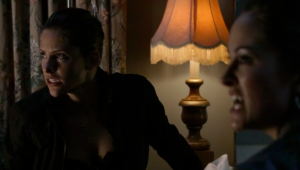
Krista vs Glynnis? Krista and Glynnis vs Collins? Krista vs Collins vs Glynnis? You mean I have to wait to find out?!?!
But all these B, C, and even D level subplots end magnificently, and together. Krista, shortly after killing her mother, is visited by Glynnis, who grabs Krista’s bag of serum. Krista and Glynnis both vamp out and we think we’re going to get a great girl-on-girl vampire fight, and I’m pumped…when Agent Collins walks in, flashing his badge and shouting “FBI!” And when both she-vampires turn their fangs towards Collins, giving him proof of what he suspected, the existence of vampires! It is a total rush…as the screen cuts to black and credits roll, making the audience wait a week (or me one day) to see the conclusion.
I have enough experience with television cliffhanger endings that I dare not hope for this scene to result the total violent riot I imagine; the fight will probably be perfunctory and end with Krista and Collins in tact, and minor character Glynnis dying to keep Krista’s allegiance secret as this show has no problem killing the minor characters. Still, the excitement of the moment was perfect and I find myself for the first time in the series greatly anticipating the next episode. And perhaps now that Krista’s secret is at risk, and now that Collins has seen vampires in person, these subplots that were given one scene per episode can take center stage as we prepare for our end-of-season showdown.
If all that is not enough praise, a couple more quick hits. First, more kudos to the writers for Shen’s dialogue in this episode’s opening scene. He’s been Blade’s whipping boy for 6 episodes, and his snarky replies at the start of this show are reminiscent of Ryan Reynolds’ Hannibal King from Blade: Trinity, especially Shen’s response when Blade complains about the A/C in the car not working: “Maybe you should get a bad-ass summer-weight coat”
I also love that little Eric Brooks is a comic book fan, reading both Avengers and Hulk. As the entire Now Playing Marvel movie retrospective was sparked by The Avengers, it was cool to see a shout-out.
Television shows often take a few episodes to reach their potential. With Sacrifice it seems Blade: The Series found its footing at last, and I cannot wait until tomorrow to see where the series goes next.
You can hear Arnie, Jakob, and Stuart review all the Blade films on the Now Playing podcast!
Read Arnie’s other Blade TV Series reviews:
| Introduction | |
| 1 | Pilot |
| 2 | Death Goes On |
| 3 | Descent |
| 4 | Bloodlines |
| 5 | The Evil Within |
| 6 | Delivery |
| 7 | Sacrifice |
| 8 | Turn of the Screw |
| 9 | Angels and Demons |
| 10 | Hunters |
| 11 | Monsters |
| 12 | Conclave |
| Conclusion | |
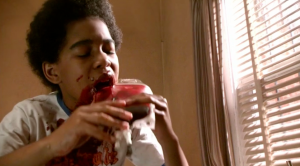
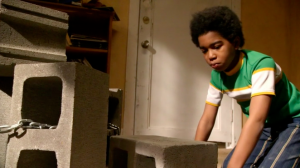
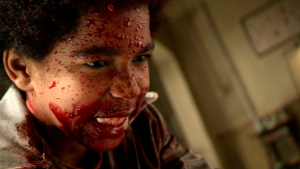
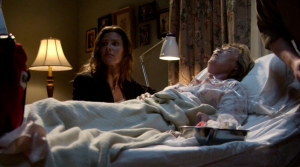
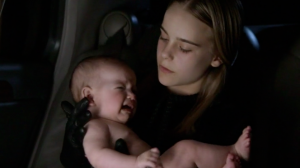
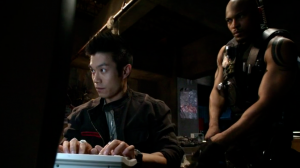
[…] Sacrifice […]
[…] Sacrifice […]
[…] Sacrifice […]
[…] Sacrifice […]
[…] Sacrifice […]
[…] Sacrifice […]
[…] Sacrifice […]
[…] be clear, I am not entirely anti-flashback. Just two episodes ago in Sacrifice we got wonderful flashbacks to Blade’s childhood, but those flashbacks were given in a way that […]